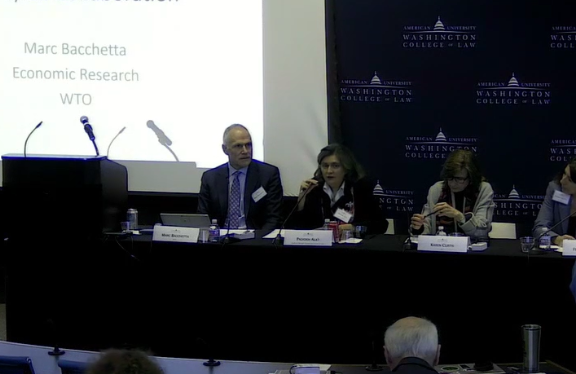International Trade, Worker Rights, and Development: New Partnerships for the Future of Work View Event Video

Texas A&M University’s Bush School of Government and Public Service and American University Washington College of Law hosted a one-day symposium entitled “International Trade, Worker Rights, and Development: New Partnerships for the Future of Work,” featuring panel discussions and a keynote lunchtime address.
Free trade agreements increasingly include provisions regulating worker rights that implicate a broad array of international actors and organizations. Trade falls under the mandate of the World Trade Organization (WTO), international labor standards fall under the mandate of the International Labor Organization (ILO), and countries striving to implement trade and labor commitments often request financial assistance from international finance organizations such as the World Bank and the International Monetary Fund (IMF).
Despite the synergies in the trade and labor nexus, the relationships between the above organizations remain to be developed. The ILO and WTO Director Generals recently committed to enhancing the relationships of their respective organizations under the theme of the “Future of Work,” but questions remain as to what form of relationship will emerge.
Supporting these relationships are important academic questions concerning the role of international finance organizations in the trade and labor nexus. The IMF, World Bank, and other international actors could play an important role in ensuring that monetary programs align with, and do not undermine, the future of work. Nevertheless, it is unclear what steps will be taken in that respect, and whether those finance programs will work in collaboration with trade and labor organizations.
Global partnerships will be critical to ensure a real future of work in view of modern day challenges. Policy makers, economists, and lawyers have consistently grappled with the relationship between trade and labor. In the absence of hard facts, both the trade regime and the worker rights regime are under attack. Critics attack trade based on their belief that increased trade necessarily undermines worker rights and leads to a race to the bottom. Critics attack worker rights provisions in trade agreements based on their belief that they necessarily limit labor market flexibility and thus undermine the very economic benefits that free trade is intended to reap. On the other hand, proponents of linking trade and labor provide, among other defenses, that this link is critical to sustainable development, providing resources and incentivizing the exportation of international labor rights along with trade goods. The symposium hosted global leaders in these areas to engage in discussion and debate, to present cutting edge research, and to build new partnerships.